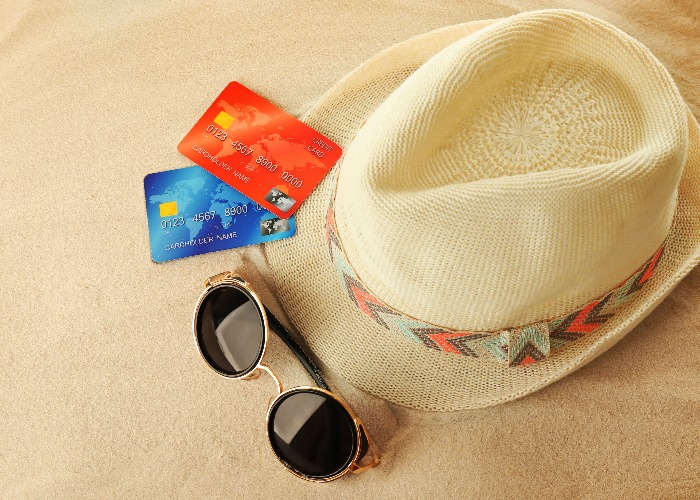Paying for a holiday? Use your credit card

Using the right credit card instead of your savings for big purchases could save and even earn you money.
It’s that expensive time of year when most of us book flights, accommodation and trips for the summer holidays.
Most of us reach for our savings account, draining the funds we’ve spent all year earning.
Yet if you are going to spend a lot of money, you’re better off doing so by credit card.
That’s because, since January, it’s been illegal for UK companies to charge you extra for paying by credit card.
That's not because we're encouraging debt: Rather, there are a number of good reasons to keep your holiday savings where they are for now and pay with plastic instead.
No fees, more protection
Whereas using a credit card last summer could cost you dozens of pounds extra, this time around you can use all the benefits of a credit card over a debit card without the extra costs.
What's more, all credit cards offer free protection under Section 75 of the Consumer Credit Act, which doesn’t apply to debit cards.
If you make a purchase valued between £100 and £30,000, you’ll get your money back if the provider goes bust. Just make sure you book with the airline directly and don't use PayPal.
When it comes to holidays, this sort of thing happens all too often, such as the collapse of Monarch Airlines last year.
If you’d booked flights with Monarch on a credit card, you would have got your money back, which is particularly useful given almost half of travel insurance policies don’t cover airline failure, according to Defaqto.
In this article we run through the best ways to pay for your holidays, saving and potentially earning you money whilst doing so.
This article assumes that you can afford to pay for the holiday upfront; if not, read our articles on saving and making money and get preparing for your next vacation.
Many premium cards offer purchase protection, which means they’ll refund you if an item is stolen or lost within 90 days. Others even offer travel insurance, although you’ll generally have to book on the card.
As always, read the terms carefully as some contain irritating exclusions, such as electronic items not qualifying for purchase protection.
Cards for earning cash and rewards
These cards can allow you to effectively earn money on your holiday booking.
Only get these cards if you have the money to pay for your purchase already in your current or savings account and can access it within the month.
That’s because you’ll need to pay the debt off within that time or pay high-interest rates that will more than wipe out any cashback or rewards you earn.
Used properly, the amount you could earn on cashback and rewards cards can be considerable.
The fee-free American Express Platinum Cashback Everyday Credit Card offers 5% cashback for the first three months. Booking flights for £500, you’d earn £25, for a purchase you’d make anyway.
Rewards cards can get you shopping vouchers or airmiles (BA Avios and Virgin Flying Club Miles) and many come with welcome bonuses for spending a minimum amount.
Spend over £1,000 on the fee-free American Express Rewards Credit Card in your first three months and you could get enough airmiles for a return flight to Paris. Read more about how to spend airmiles here.

You’ll notice that many of the cards we mention are issued by American Express, which isn’t accepted by all booking sites, so check first.
Compare cashback and rewards credit cards on loveMONEY’s comparison site.
Cards for protecting your savings
If you want to pay for a holiday and avoid using your savings, then get a 0% purchase credit card instead.
These cards could allow you to stretch out the cost of your holiday over 30 months, without fees or interest; you only need to make minimum monthly payments.
MBNA, Post Office Money, Sainsbury's, Tesco and Virgin Money all offer 28-month or more interest-free cards. Santander even offers a 30-month card with 0.5% cashback – although you’d need to spend at least £634 a month on it to cover the £3 monthly fee.
Whilst paying off your holiday with your salary, you could earn money with your savings by putting them in the right account.
£1,000 in savings could earn you £50 in interest if put into Nationwide’s FlexDirect current account for a year, for example.
Find the best 0% purchase credit cards here
Cards for when you’re on holiday
Continue saving money – and earning it – by using the right credit card whilst you’re travelling abroad.
There are a handful of credit cards that have no charges for using abroad, which could save you hundreds of pounds.
Providing you pay your balance off every month and don’t withdraw cash you can avoid paying interest.
Barclays and challenger bank Tandem both offer credit cards with no foreign spending fees and 0.25% / 0.5% cashback respectively.
The Halifax Clarity, Creation Everyday and Santander Zero cards all have zero fees for foreign spending.
If you do need to withdraw cash on the other cards, paying your credit card off quickly is still likely to cost you less than the charges on most debit and credit cards.
Read more: new taxes in Greece and hikes in Majorca as tourist taxes spread across Europe.
Comments
Be the first to comment
Do you want to comment on this article? You need to be signed in for this feature